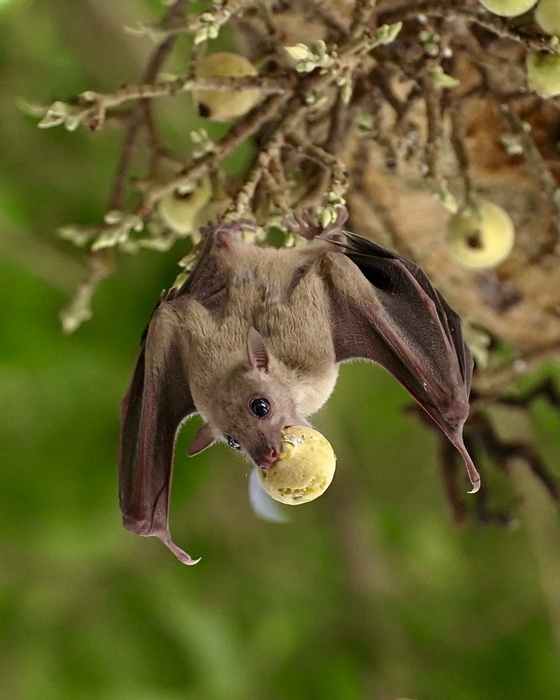Many mammals suffer hearing loss in old age, but bats were thought to be immune to this phenomenon because of the importance of hearing for echolocation. However, researchers in Israel have discovered that bats lose their hearing in old age just like humans do. Yet the study, published March 30 in the journal Life Science Alliance, suggests that, because they roost in extremely noisy colonies that would quickly damage the hearing of humans and other mammals, bats may have evolved some innate ability to limit this age-associated hearing loss.

Credit: © Yuval Barkai, 2023.
Many mammals suffer hearing loss in old age, but bats were thought to be immune to this phenomenon because of the importance of hearing for echolocation. However, researchers in Israel have discovered that bats lose their hearing in old age just like humans do. Yet the study, published March 30 in the journal Life Science Alliance, suggests that, because they roost in extremely noisy colonies that would quickly damage the hearing of humans and other mammals, bats may have evolved some innate ability to limit this age-associated hearing loss.
Many bat species have an extremely long lifespan—over 40 years—compared to other mammals of a similar size, such as mice. “While high-frequency hearing confers a survival benefit for many animals, it is essential for the survival of echolocating bats, which rely on it for orienting in their environment,” explains Yossi Yovel, a neuroecologist at Tel Aviv University. “However, to date, no study has systematically examined the effect of age on hearing in bats.”
PhD candidate Yifat Tarnovsky from the Yovel lab and colleagues from Tel Aviv and Maryland Universities evaluated the age of 47 wild Egyptian fruit bats (Rousettus aegyptiacus) by measuring the accumulation of chemical marks on the animals’ DNA. The researchers then tested the bats’ hearing by monitoring their brains’ electrical responses to sounds of varying pitch and volume. The recordings revealed a clear age-related hearing loss that, just as in humans, was particularly pronounced at higher sound frequencies. Moreover, the rate of hearing loss, ~1 dB/year of age, is very similar to the rate observed in aging humans.
Further tests suggest that, similar to humans, bats experience an age-related decline in the structure and function of their cochlea, as well as a decrease in the speed of auditory nerve processing. This latter symptom, known as neuronal presbycusis, can impair the understanding of speech in humans and could make echolocation more difficult for aged bats.
“The fruit bats that we studied rely on echolocation for various tasks but they also heavily rely on vision when possible,” Tarnovsky says. “It will therefore be important to replicate our tests in bats with poor vision, where echolocation is nearly the only mechanism of orientation.”
One possible contributor to the fruit bats’ hearing loss is their cumulative exposure to high noise levels in their environment. Like many other bat species, Egyptian fruit bats live in large colonies and emit frequent, loud, social calls to one another. Tarnovsky and colleagues placed several microphones within the fruit bats’ cave and found that the animals are continuously exposed to over 100 dB of noise, roughly equivalent to the noise of a motorcycle or chainsaw. Surprisingly, however, the loudest sounds were at lower frequencies at which the bats show little to no hearing loss in old age.
“When taken together, the very high levels of noise that fruit-bats are exposed to and the mild (similar to human) levels of age-related hearing loss suggest that bats might have some special adaptations to cope with their very noisy environments,” Yovel says. The researchers hope that understanding these adaptations could provide insights into the mechanisms of age-related hearing loss in humans.
Tarnovsky et al., 2023. Life Science Alliance https://www.life-science-alliance.org/content/6/6/e202201847?PR
# # #
About Life Science Alliance
Life Science Alliance (LSA) is a global, open-access, editorially independent, and peer-reviewed journal launched in 2018 by an alliance of EMBO Press, Rockefeller University Press, and Cold Spring Harbor Laboratory Press. LSA is committed to rapid, fair, and transparent publication of valuable research from across all areas in the life sciences. For more information, visit lsajournal.org.
Visit the Rockefeller University Press Newsroom, and sign up for a weekly preview of articles to be published. Embargoed media alerts are for journalists only.
Follow LSA on Twitter at @LSAjournal.
Journal
Life Science Alliance
DOI
10.26508/lsa.202201847
Method of Research
Observational study
Subject of Research
Animals
Article Title
Bats experience age-related hearing loss (presbycusis)
Article Publication Date
30-Mar-2023




